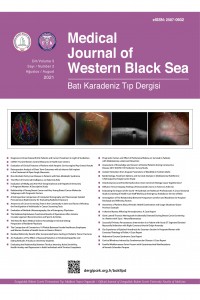Genç Meme Kanseri İle Çok Genç Meme Kanseri Moleküler Altgruplarının Prognostik Faktörlerle İlişkisi
Abstract
Amaç: Genç meme kanseri, 40 yaş altında meme kanseri tanısı almış hasta grubunun tanımıdır. Genç yaş meme kanseri grubunun prognozu çok kötüdür. Buna ek olarak, meme kanseri 35 yaşın altında tanısı konulduğunda çok genç meme kanseri grubu olarak adlandırılır ve prognoz genç meme kanseri grubundan çok daha kötüdür. Bu çalışmada genç meme kanseri hastalarının moleküler alt grupları ve prognostik faktörler değerlendirildi ve çok genç meme kanseri grubu ile karşılaştırıldı.
Gereç ve Yöntemler: Çalışmada Kocaeli Üniversitesi Tıp Fakültesi Genel Cerrahi Anabilim Dalı Meme Cerrahisi Ünitesi'nde Ekim 2013- Şubat 2018 tarihleri arasında meme kanseri tanısı alan 624 hasta değerlendirildi.
Bulgular: İki grup arasında demografik veriler, patolojik veriler, moleküler sınıflandırma ve hastalık sağkalım verileri açısından istatistiksel olarak anlamlı bir fark saptanmadı. Sağkalım analizinde çok genç meme kanseri grubu ile genç meme kanseri grubu arasında istatistiksel olarak anlamlı fark bulunmadı.
Sonuçlar: Genç meme kanseri grubunun hem hastalık özellikleri hem de sağkalım açısından daha kötü olduğu görüldü. Ancak özellikle moleküler alt gruplar ve prognoz açısından çok genç meme kanseri grubu ile genç meme kanseri grubu arasında fark bulunmadı ve ayrı bir grup olarak tedavi edilmesi gerekmediği sonucuna varıldı.
Keywords
Meme kanseri Genç meme kanseri Çok genç meme kanseri Moleküler altgruplar Prognostik faktörler
References
- 1) Rosenberg SM, Partridge AH. Management of breast cancer in very young women. Breast 2015; 24(2): 154-158.
- 2) Azim HA Jr, Partridge AH. Biology of breast cancer in young women. Breast Cancer Res 2014; 16(4): 427.
- 3) Keegan TH, DeRouen MC, Press DJ, Kurian AW, Clarke CA. Occurrence of breast cancer subtypes in adolescent and young adult women. Breast Cancer Res. 2012; 27;14(2):R55.
- 4) Radecka B, Litwiniuk M. Breast cancer in young women. Ginekol Pol. 2016; 87(9):659-663.
- 5) Farouk O, Ebrahim MA, Senbel A, Emarah Z, Abozeed W, Seisa MO, Mackisack S, Abdel Jalil S, Abdelhady S. Breast cancer characteristics in very young Egyptian women ≤35 years. Breast Cancer (Dove Med Press). 2016; 5;8:53-8.
- 6) Assi HA, Khoury KE, Dbouk H, Khalil LE, Mouhieddine TH, El Saghir NS. Epidemiology and prognosis of breast cancer in young women. J Thorac Dis 2013; 5(Suppl. 1):S2e8.
- 7) Cardoso F, Loibl S, Pagani O, Graziottin A, Panizza P, Martincich L, Gentilini O, Peccatori F, Fourquet A, Delaloge S, Marotti L, Penault-Llorca F, Kotti-Kitromilidou AM, Rodger A, Harbeck N; European Society of Breast Cancer Specialists. The European Society of Breast Cancer Specialists recommendations for the management of young women with breast cancer. Eur J Cancer. 2012; 48(18):3355-77.
- 8) Winchester DP, Osteen RT, Menck HR. The National Cancer Data Base report on breast carcinoma characteristics and outcome in rela- tion to age. Cancer 1996; 78: 1838–1843.
Relationship of Young Breast Cancer and Very Young Breast Cancer Molecular Subgroups with Prognostic Factors
Abstract
Objective: Young breast cancer is a description of a patient group diagnosed with breast cancer, especially those under 40 years of age. the prognosis of younger age group is very poor. In this study, molecular subgroups of young breast cancer patients and prognostic factors were assessed and compared with a very young breast cancer group.
Methods: No statistically significant difference was found between the two groups in terms of demographic data, pathological data, molecular classification and disease survival data. In the survival analysis, there was no statistically significant difference between very young breast cancer group and young breast cancer group.
Results: Young breast cancer is worse in terms of both disease characteristics and survival. But especially in terms of molecular subgrouping and in terms of prognosis very young breast cancer group may not need to be treated as a separate group other than the young breast cancer group.
Keywords
Breast cancer Young breast cancer Very young breast cancer Molecular subtypes Prognostic factors
References
- 1) Rosenberg SM, Partridge AH. Management of breast cancer in very young women. Breast 2015; 24(2): 154-158.
- 2) Azim HA Jr, Partridge AH. Biology of breast cancer in young women. Breast Cancer Res 2014; 16(4): 427.
- 3) Keegan TH, DeRouen MC, Press DJ, Kurian AW, Clarke CA. Occurrence of breast cancer subtypes in adolescent and young adult women. Breast Cancer Res. 2012; 27;14(2):R55.
- 4) Radecka B, Litwiniuk M. Breast cancer in young women. Ginekol Pol. 2016; 87(9):659-663.
- 5) Farouk O, Ebrahim MA, Senbel A, Emarah Z, Abozeed W, Seisa MO, Mackisack S, Abdel Jalil S, Abdelhady S. Breast cancer characteristics in very young Egyptian women ≤35 years. Breast Cancer (Dove Med Press). 2016; 5;8:53-8.
- 6) Assi HA, Khoury KE, Dbouk H, Khalil LE, Mouhieddine TH, El Saghir NS. Epidemiology and prognosis of breast cancer in young women. J Thorac Dis 2013; 5(Suppl. 1):S2e8.
- 7) Cardoso F, Loibl S, Pagani O, Graziottin A, Panizza P, Martincich L, Gentilini O, Peccatori F, Fourquet A, Delaloge S, Marotti L, Penault-Llorca F, Kotti-Kitromilidou AM, Rodger A, Harbeck N; European Society of Breast Cancer Specialists. The European Society of Breast Cancer Specialists recommendations for the management of young women with breast cancer. Eur J Cancer. 2012; 48(18):3355-77.
- 8) Winchester DP, Osteen RT, Menck HR. The National Cancer Data Base report on breast carcinoma characteristics and outcome in rela- tion to age. Cancer 1996; 78: 1838–1843.
Details
| Primary Language | Turkish |
|---|---|
| Subjects | Health Care Administration |
| Journal Section | Research Article |
| Authors | |
| Publication Date | May 29, 2021 |
| Acceptance Date | February 3, 2021 |
| Published in Issue | Year 2021 Volume: 5 Issue: 2 |

